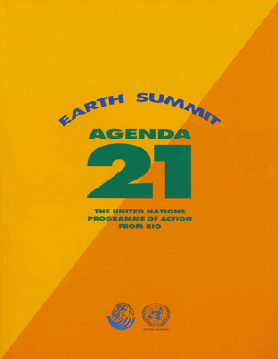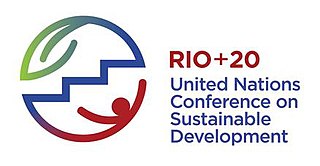
The United Nations Environment Programme (UNEP) is responsible for coordinating responses to environmental issues within the United Nations system. It was established by Maurice Strong, its first director, after the United Nations Conference on the Human Environment in Stockholm in June 1972. Its mandate is to provide leadership, deliver science and develop solutions on a wide range of issues, including climate change, the management of marine and terrestrial ecosystems, and green economic development. The organization also develops international environmental agreements; publishes and promotes environmental science and helps national governments achieve environmental targets.
The World Summit on Sustainable Development 2002, took place in South Africa, from 26 August to 4 September 2002. It was convened to discuss sustainable development organizations, 10 years after the first Earth Summit in Rio de Janeiro.

Agenda 21 is a non-binding action plan of the United Nations with regard to sustainable development. It is a product of the Earth Summit held in Rio de Janeiro, Brazil, in 1992. It is an action agenda for the UN, other multilateral organizations, and individual governments around the world that can be executed at local, national, and global levels. One major objective of the Agenda 21 initiative is that every local government should draw its own local Agenda 21. Its aim initially was to achieve global sustainable development by 2000, with the "21" in Agenda 21 referring to the original target of the 21st century.
Rio Convention relates to the following three conventions, which were agreed at the Earth Summit held in Rio de Janeiro in June 1992.

The United Nations Conference on Environment and Development (UNCED), also known as the RioConference or the Earth Summit, was a major United Nations conference held in Rio de Janeiro from 3 to 14 June 1992.

The Global Environment Facility (GEF) is a multilateral environmental fund that provides grants and blended finance for projects related to biodiversity, climate change, international waters, land degradation, persistent organic pollutants (POPs), mercury, sustainable forest management, food security, and sustainable cities in developing countries. It is the largest source of multilateral funding for biodiversity globally, and distributes more than $1 billion a year on average to address inter-related environmental challenges.
The Earth Charter is an international declaration of fundamental values and principles considered useful by its supporters for building a just, sustainable, and peaceful global society in the 21st century. Created by a global consultation process, and endorsed by organizations representing millions of people, the Charter "seeks to inspire in all peoples a sense of global interdependence and shared responsibility for the well-being of the human family, the greater community of life, and future generations." It calls upon humanity to help create a global partnership at a critical juncture in history. The Earth Charter's ethical vision proposes that environmental protection, human rights, equitable human development, and peace are interdependent and indivisible. The Charter attempts to provide a new framework for thinking about and addressing these issues. The Earth Charter Initiative organization exists to promote the Charter.
The United Nations Commission on Sustainable Development (CSD) was a body under the UN Economic and Social Council (ECOSOC) tasked with overseeing the outcomes of the 1992 United Nations Conference on Environment and Development/Earth Summit. It was replaced in 2013 by the High-level Political Forum on Sustainable Development, which meets both under the General Assembly every four years and the ECOSOC in other years.
James William MacNeill, OC was a Canadian consultant, environmentalist, and international public servant.
The United Nations Conference on the Human Environment was held in Stockholm, Sweden, during June 5–16, 1972.
The International Institute for Environment and Development (IIED) is an independent policy research institute whose stated mission is to "build a fairer, more sustainable world, using evidence, action and influence in partnership with others." Its director is Dr Tom Mitchell.

Global Green is the English-American affiliate of Green Cross International, an international non-governmental organization founded by former Soviet leader Mikhail Gorbachev in 1993 to "foster a global value shift toward a sustainable and secure future." Green Cross International operates in over 30 countries and enjoys consultative status with the United Nations Economic and Social Council, and United Nations Educational, Scientific and Cultural Organization. Global Green USA is on a 10 year mission to "lead a global response to keep us within planetary boundaries" and to "bring forth a sustainable global society founded on respect for nature, universal human rights, economic justice, and a culture of peace". GCI is an admitted observer organization with the United Nations Framework Convention on Climate Change and the Conference of the Parties to the UN Convention to Combat Desertification. It also cooperates directly with the UNEP/OCHA Environmental Emergencies Section, UN-HABITAT and other international organizations. Celebrity advocates include Leonardo DiCaprio, Yoko Ono and Pat Mitchell, who serves as an Honorary Board Member.

The United Nations Forum on Forests (UNFF) is a high-level intergovernmental policy forum. The forum includes all United Nations member states and permanent observers, the UNFF Secretariat, the Collaborative Partnership on Forests, Regional Organizations and Processes and Major Groups.

Felix Dodds, born Michael Nicholas Dodds, is a British author, futurist, and activist.
Women Engage for a Common Future (WECF), formerly known as Women in Europe for a Common Future, is a non-governmental organization created in 1994 following the 1992 Earth Summit in Rio de Janeiro. The aim of the organization is to "achieve an equitable and sustainable healthy environment for all". WECF is a network of more than 150 women's and environmental organizations in 50 countries worldwide. WECF also works on national, European, UN and international political levels with the aim to increase women's influence in political decision-making processes.

The United Nations Conference on Sustainable Development (UNCSD), also known as Rio 2012, Rio+20, or Earth Summit 2012 was the third international conference on sustainable development aimed at reconciling the economic and environmental goals of the global community. Hosted by Brazil in Rio de Janeiro from 13 to 22 June 2012, Rio+20 was a 20-year follow-up to the 1992 United Nations Conference on Environment and Development (UNCED) held in the same city, and the 10th anniversary of the 2002 World Summit on Sustainable Development (WSSD) in Johannesburg.

The International Resource Panel is a scientific panel of experts that aims to help nations use natural resources sustainably without compromising economic growth and human needs. It provides independent scientific assessments and expert advice on a variety of areas, including:

The United Nations Environment Programme Finance Initiative is a partnership between the United Nations Environment Program (UNEP) and the global financial sector to catalyse action across the financial system to align economies with sustainable development. As the UN partner for the finance sector, they convene financial institutions on a voluntary basis to work together with them, and each other, to find practical solutions to overcome the many sustainability challenges facing the world today. UNEP FI does this by providing practical guidance and tools which support institutions in the finance sector to find ways to reshape their businesses and commit to targets for limiting greenhouse gas emissions, protecting nature, promoting a circular economy and supporting financial inclusion to address inequality. The solutions developed effectively form a blueprint for others in the finance sector to tackle similar challenges and evolve their businesses along a sustainable pathway. The creation and adoption of such a blueprint also informs policy makers concerned with sustainability issues about what would constitute appropriate regulation for the finance sector at large. Founded in 1992, UNEP FI was the first organisation to pioneer engagement with the finance sector around sustainability. The Finance Initiative was responsible for incubating the Principles for Responsible Investment and for the development and implementation of UNEP FI’s Principles for Responsible Banking and Principles for Sustainable Insurance as well as the UN-convened net-zero alliances. Today, UNEP FI provides sustainability leadership to more than 400 financial institutions, with assets of well over $80 trillion headquartered around the world.
Green Cross Brazil is part of Green Cross International network. That was founded by former Soviet Union President and Nobel Peace Prize laureate Mikhail Gorbachev in 1993, building upon the work started by the 1992 Earth Summit in Rio de Janeiro, Brazil.
The Earth Summits are decennial meetings of world leaders, organized since 1972 with help of the United Nations, to help defining ways to stimulate sustainable development at the global level. The aim is to bring together the best individuals and organisations humanity can bring forward from all kind of categories of life, to identify and update what are humanity's most pressing challenges, to quantify them, identify solutions and develop a plan of action not to run into a wall. This plan of action is called Agenda 21 and implemented by many local governments under the name Local Agenda 21. The plan of action is designed as a TQM - Total Quality Manual, designed smartly and open enough, so that also organisations, companies and individuals can use it as a basis for their own plan of action and guidance not to miss out on important issue; it helps speed up understanding and identifying partners by e.g. using similar wordings and symbols. The 2000-2015 Millennium Development Goals and the 2015-2030 Global Goals are results from these Earth Summits. The first summit took place in Rio de Janeiro (Brazil) in 1992. Last Earth Summit, called Rio+20, also took place in Rio de Janeiro in 2012.










